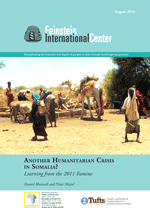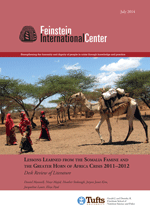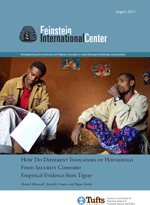by Feinstein Center | August 1, 2015
This project is a major retrospective study of the 2010-2011 Somalia famine. It considers the reasons for the delayed international response, the engagement of non-western humanitarian actors, and the agency and actions of affected communities and groups in protecting their own livelihoods and lives. The project also develops interventions to build resilience in the famine-affected areas.

by Kristin Carnes | August 14, 2014
After two reasonably good years of recovery, 2014 appears to be shaping up as a difficult year for Somalia. Donors and agencies are ringing alarm bells about deteriorating conditions. There is some discussion in humanitarian circles in Nairobi of “another 2011”—only...

by Ann O'Brien | July 31, 2014
On July 20, 2011, the UN declared a famine in South Central Somalia, which killed some 260,000 people (Checchi and Robinson 2013). Though Somalia was the worst affected country, the crisis was region-wide in its impact. This Desk Review covers the contents of some 180...
by admin_jackrabbit | September 20, 2013
The Feinstein study on Targeting in Complex Emergencies led the WFP to rethink the way in which it involves recipient communities in the management and targeting of assistance in conflict and complex emergencies.

by Kristin Carnes | August 10, 2013
With recent food crises at both regional and global levels, and renewed commitments from major donor countries to address chronic hunger, food security is more prominent on the policy agenda today than it has been in the past. This has intensified the search for...



